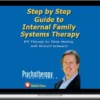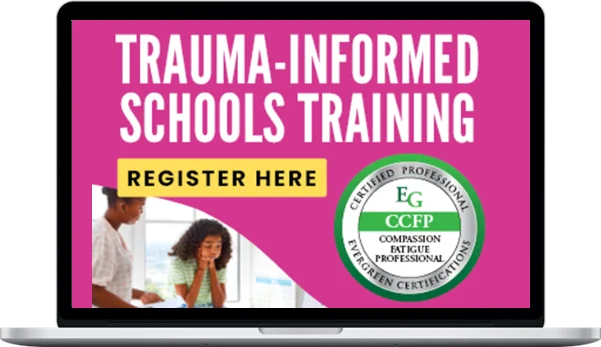Pesi – Trauma-Informed Schools Training for School-Based Professionals
$48.99 $29.00
Total Sold: 1
»Instant Delivery
Description
Pesi – Trauma-Informed Schools Training for School-Based Professionals
As the rate of trauma in kids and adolescents skyrockets, you might be the only safe person in a kid’s life.
School-based professionals like you are pivotal in recognizing suicidality, depression, anxiety, PTSD, abuse, and other, sometimes life-threatening, problems.
Here’s something you may not know… being a trauma-informed professional is so important, that a federal law was adopted in 2022 stating that funds can be used to support evidence-based trauma practices in schools.
This specialized training course is taught by a panel of expert educators and clinicians with decades of experience in the classroom and clinical office. They’ll equip you with the knowledge and skills necessary to help intervene immediately, prevent problems from worsening, and foster resilience. You’ll learn trauma-informed care techniques for the classroom and be able to implement evidence-based strategies for supporting kids with diverse mental health problems.
Walk away from this course able to…
- Identify early signs of depression and suicidality and respond to self-harm effectively
- Guide students and clients through grief based on their developmental stage
- Strengthen the school-family alliance with culturally-responsive tips
- Use mindfulness, rituals, routines, games, and play for co-regulation
- Help coordinate school-wide pre and post-intervention plans for crises
- Support students going through divorce, death, tragedy, illness, abuse, large-scale disasters, and more
PLUS, you’ll learn how to create effective support groups and foster an atmosphere of psychological safety for everyone!
As an exclusive bonus, you’ll get a full training that meets the requirements to become a Certified Compassion Fatigue Professional, completely FREE! So, you’ll always have the vitality and energy to keep supporting kids and feeling invigorated in your important career!
Register now to transform the lives of struggling kids — while elevating your education and career!
Course Outline
Whether you’re a therapist, school social worker, psychologist, teacher, school nurse, or other school-based and helping professional, this course will give you specific strategies and skills to ensure you can support students facing any type of adversity.
Modue 1: Trauma-Informed Schools and Adverse Childhood Experiences Training
Get step-by-step directions, tools, and techniques you need to support kids with trauma histories, mental health concerns, and struggling academic performance. Be able to:
- Identify the “silent sufferers” in your classroom and understand developmental trauma
- Foster teamwork and cooperation with diverse care teams to create a better school climate
- Improve school safety and create psychologically-safe classrooms
- Boost academic achievement with early intervention for mental health problems
- Support kids with behavioural problems using trauma-sensitive corrective action
Module 2: Trauma, Grief and Loss in the Classroom
Gain specialized training in helping students who’ve experienced violence and trauma at school. Learn to:
- Immediately apply techniques to support grieving and traumatized children
- Understand how intensity and duration of grief stages manifest in kids
- Advocate for long-term, school-wide postvention plans & help coordinate district-wide interventions
- Confront and overcome irrational fears with developmental stage-specific strategies
- Support staff members and parents and utilize outside resources
- Plus, get case examples of established, successful post-vention plans.
Module 3: Self-Harm, Suicide & Depression in Schools
Learn the best strategies for identification, prevention, and postvention among students with depression, self-harm, and suicidal ideation (at both the classroom and school-wide level). Walk away with…
- Must-knows about confidentiality, info sharing, & notifying parents
- The ability to identify hidden and telltale warning signs, determine susceptibility, & identify vulnerability
- Understand the “why” of self-harm so you can connect with students
- Skills to approach the interconnected role of addiction effectively
- The ability to minimize the risk of self-harm and create suicide contagion plans & school-wide interventions
Module 4: Mindfulness Practices to Build Resilience and Post-Traumatic Growth
Practice mindfulness, positive psychology, self-regulation, and mind-body integration exercises that will help you…
- Boost cognitive clarity and functioning
- Capitalize on new strengths and skills learned in isolation
- Overcome feelings of helplessness and loss of control
- Rebuild social and emotional intelligence
- All through fully experiential learning!
More courses from the same author: Pesi
Delivery Policy
When will I receive my course?
You will receive a link to download your course immediately or within 1 to 21 days. It depends on the product you buy, so please read the short description of the product carefully before making a purchase.
How is my course delivered?
We share courses through Google Drive, so once your order is complete, you'll receive an invitation to view the course in your email.
To avoid any delay in delivery, please provide a Google mail and enter your email address correctly in the Checkout Page.
In case you submit a wrong email address, please contact us to resend the course to the correct email.
How do I check status of my order?
Please log in to HealthcareCourse account then go to Order Page. You will find all your orders includes number, date, status and total price.
If the status is Processing: Your course is being uploaded. Please be patient and wait for us to complete your order. If your order has multiple courses and one of them has not been updated with the download link, the status of the order is also Processing.
If the status is Completed: Your course is ready for immediate download. Click "VIEW" to view details and download the course.
Where can I find my course?
Once your order is complete, a link to download the course will automatically be sent to your email.
You can also get the download link by logging into your HealthcareCourse account then going to Downloads Page.
Related products
Total sold: 8
Total sold: 3
Total sold: 2








